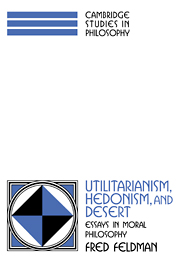Book contents
- Frontmatter
- Contents
- Acknowledgments
- Sources
- Introduction
- Part I Utilitarianism
- Part II Hedonism
- Part III Desert
- 8 Adjusting utility for justice: A consequentialist reply to the objection from justice
- 9 Desert: Reconsideration of some received wisdom
- 10 Justice, desert, and the Repugnant Conclusion
- Index of subjects
- Index of persons
- Index of cases
10 - Justice, desert, and the Repugnant Conclusion
Published online by Cambridge University Press: 05 June 2012
- Frontmatter
- Contents
- Acknowledgments
- Sources
- Introduction
- Part I Utilitarianism
- Part II Hedonism
- Part III Desert
- 8 Adjusting utility for justice: A consequentialist reply to the objection from justice
- 9 Desert: Reconsideration of some received wisdom
- 10 Justice, desert, and the Repugnant Conclusion
- Index of subjects
- Index of persons
- Index of cases
Summary
INTRODUCTORY COMMENTS
Each of the hedonistic axiologies that I described in “Mill, Moore, and the Consistency of Qualified Hedonism” is a form of “totalism.” So is the desert-adjusted axiology of “Adjusting Utility for Justice.” In the present context, we may understand totalism to be the view that the value of a whole possible world is the sum of the values received by the inhabitants of that world.
Totalism has great intuitive appeal. It may seem obvious that all the value of a world must be distributed among those who receive value in that world. How could the value of the world be different from the sum of the values received by those in the world who receive value?
However, a number of philosophers have recognized that problems arise when we compare worlds with populations of dramatically different sizes. If there are very many recipients of value in a world, then the sum of their receipts may be quite large, even if each recipient receives just a tiny share. The sum is large not because each lives such a good life, but because there are so many of them. Totalism declares such a world to be very good, but it may seem less good than a less populous world in which each recipient gets much more but the total is smaller. This would seem to show that totalism is false.
- Type
- Chapter
- Information
- Utilitarianism, Hedonism, and DesertEssays in Moral Philosophy, pp. 193 - 214Publisher: Cambridge University PressPrint publication year: 1997



